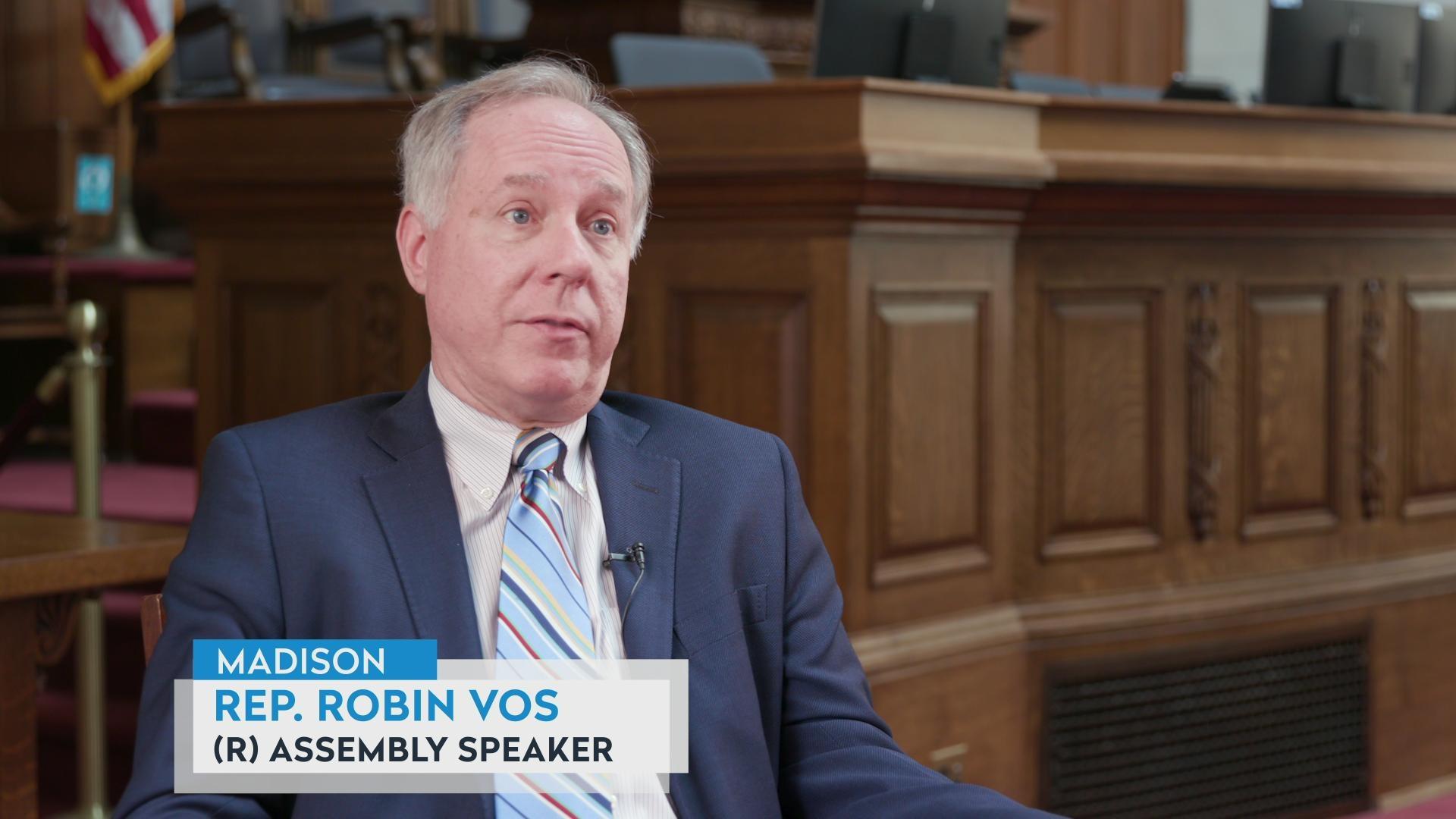Frederica Freyberg:
Looking ahead to the August 14th primary election and another in our one-on-one interviews with candidates running for governor. Tonight we talk with Democrat Josh Pade. He’s a Kenosha native and attorney. He studied law in Boston and worked in Washington D.C. Pade also has volunteered on a variety of democratic campaigns. Josh Pade joins us now and thanks very much for doing so.
Josh Pade:
Thanks for having me.
Frederica Freyberg:
We wanted to ask you right out of the chutes why you should be the choice for democrats?
Josh Pade:
You know, it’s been a pleasure getting in this race and, you know, coming as a newcomer, as an outsider. As I travel around the state of Wisconsin, the more I travel, the more I hear there is such a need for a new chapter in Wisconsin politics. And I think that my candidacy, my story, my message, gives voters the best opportunity to have a fresh start, have a vision that takes Wisconsin beyond, you know, the controversies of today to building a vision for what Wisconsin can look like in the next 10, 20 years. Because we’re at a period of immense change. The global economy, technology, the challenges we face here in Wisconsin with education, the environment. How are we going to grapple with all these things and still get stuck in the sort of divisive politics that have paralyzed our state for too long? I think my candidacy and what I represent is a new start, a new vision for Wisconsin. People are — they’re ready for that.
Frederica Freyberg:
As you know, in the latest Marquette Law School poll, you garnered zero percent of the respondents’ votes. Others with higher poll numbers have dropped out. Will you?
Josh Pade:
No. We’re in this until the primary. There’s another poll that came out yesterday as well. What it shows is that a lot of people are undecided. A lot of people are looking and listening and willing to change. I think it’s — when you look at the broad scope of the polling and where the electorate is, we have a lot of choices and that’s challenging for a voter. And I’m out there working hard across the state giving people an opportunity to learn why I’m the best choice.
Frederica Freyberg:
Why aspire at this juncture to the kind of highest office in the state?
Josh Pade:
So I’ve been tell people I don’t view it as a ranking. I view it as the role and the responsibility and how it matches specific experiences and specific visions. So for me, it’s having lived across the state of Wisconsin. It’s having connection with communities up north, eastern and western Wisconsin and growing up in southeastern Wisconsin, we have to take our values as politicians, what we believe in, and translate that to policies that connect all the communities.
Frederica Freyberg:
Say that the pundits and the pollsters are wrong and you win the primary. Why could you beat Scott Walker?
Josh Pade:
For a number of reasons. One, I think that I provide an alternative to the politics that we have and provide a fresh vision that really provides that contrast that’s not just an opposition to Governor Walker, but a new way forward. And I think that’s why I’m the best person to go against the governor for his third term.
Frederica Freyberg:
On the issues, what in your mind is the most important thing that Wisconsin needs to do toward the economy and jobs?
Josh Pade:
Two big things. One is getting our focus back on education, both K through 12 and higher education, focusing on closing that skills gap. You know, across the state of Wisconsin, the economy overall across the country is doing well. We just found out it grew about 4.1% in the last quarter. But it’s not translating into wage growth, particularly here in Wisconsin. What that means we need to get people into those jobs that are paying well. And we– I’ve focused on trying to think of new– rethinking ways of doing things. New and innovative ways of getting people into those jobs. So that means using technology, partnering with technology companies to understand how one person in one industry could have a set of skills that would be applied to another industry that don’t appear on its face. We’ve seen this happen I think in Colorado. They did a program and they found out that, you know, bank tellers had the skill set that could apply to the cybersecurity industry and were able to mitigate the gap very quickly so people that were losing jobs to automation were able to go into that industry.
Frederica Freyberg:
So this would be kind of a public-private partnership whereby businesses would help effect this?
Josh Pade:
Absolutely.
Frederica Freyberg:
As to Foxconn and now the potential taxpayer dollars for Kimberly-Clark, what’s your position there?
Josh Pade:
We have to step back from corporate welfare. The purpose of economic development dollars should be to grow home-grown businesses. You know, if you look at economic development across the country, what programs work, what don’t work. The ones that provide the highest rate of return for the state are ones where you focus on growing jobs in the state, growing businesses in the state. Foxconn, we have committed to bringing a new industry, a new company to Wisconsin. We need to think about two big things. How do we move forward in a way that maximizes what we’re going to get on our investment? Be strict and hold them accountable on what they’re committing to and the environment. And then, three, ensure once again that workers here in Wisconsin can have the skills to work in advanced manufacturing and get those good-paying jobs and that they can get to those jobs.
Frederica Freyberg:
What if anything do you think Wisconsin should do differently around health care?
Josh Pade:
First thing we need to do is take the federal money, the Medicaid expansion money. If you look at Wisconsin compared to our neighboring state, we’re paying much more for premiums under the Affordable Care Act than they are and that’s because we’re not taking our hard-earning federal tax dollars and using that to make Medicaid affordable. Let’s bring it in. Let’s bring in innovation and understand ways in which we can bring down the cost of health care and expand access. And then let’s also focus on a lot of the other problems that people have to get access to care, like dental care and eye care. Too often in Wisconsin the first time somebody gets dental care is when they go to the emergency room. That often has long-term health effects beyond just dental care. So thinking about that and then also thinking about advancing our infrastructure so we can have more mobile health care providers.
Frederica Freyberg:
Josh Pade, thanks very much.
Josh Pade:
Thank you.
Search Episodes
News Stories from PBS Wisconsin

Donate to sign up. Activate and sign in to Passport. It's that easy to help PBS Wisconsin serve your community through media that educates, inspires, and entertains.
Make your membership gift today
Only for new users: Activate Passport using your code or email address
Already a member?
Look up my account
Need some help? Go to FAQ or visit PBS Passport Help
Need help accessing PBS Wisconsin anywhere?

Online Access | Platform & Device Access | Cable or Satellite Access | Over-The-Air Access
Visit Access Guide
Need help accessing PBS Wisconsin anywhere?

Visit Our
Live TV Access Guide
Online AccessPlatform & Device Access
Cable or Satellite Access
Over-The-Air Access
Visit Access Guide
 Passport
Passport


















Follow Us